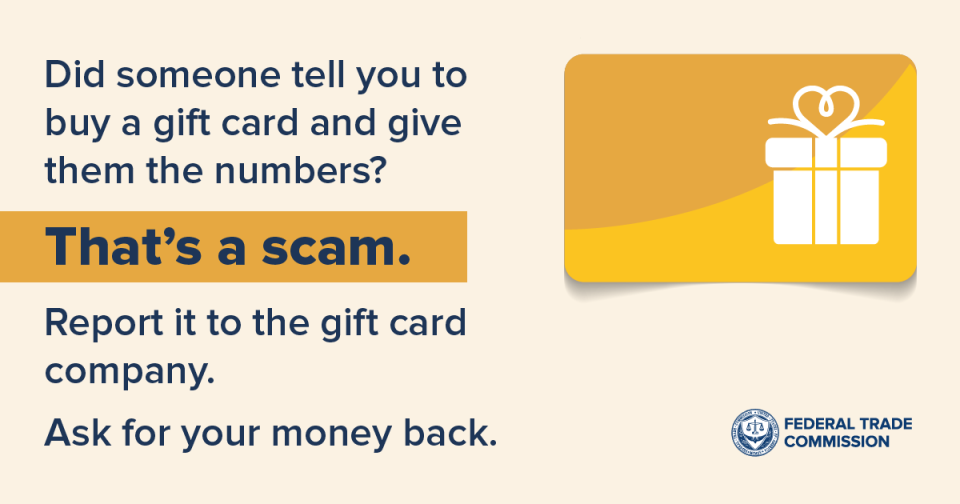If you’re in the checkout line with a gift card (or several) in your hand, ask yourself: is the gift card you’re buying for a gift? Or is someone on the phone with you as you’re checking out telling you what to do – like buy a gift card to pay for something and give them the numbers? Gift cards are ONLY for gifts. That means if the gift card isn’t for someone’s birthday, anniversary, or for any other gift giving reason, it’s a scam.
Gift card scammers only want your money. First they’ll call, text, email, or send a social media message. Then comes a made-up story: They’re from the government (pay taxes or a fine), tech support (something’s wrong with your computer – pay to fix it), or you’ve won a prize (but pay for it first.) Other scammers might use AI voice cloning to sound like a family member in trouble. It’s always urgent. They always want you to act fast or something bad will happen. And it’s always a scam.
Think you gave gift card numbers to a scammer? Act fast. Grab your gift card and the gift card receipt. Then,
- Report the gift card scam to the gift card company. It doesn’t matter when the scam happened. Use this How To Contact Gift Card Companies list to report it.
- Ask for your money back. Some companies are helping stop gift card scams and might give your money back. Always ask.
- Tell the FTC at ReportFraud.ftc.gov. Your report makes a difference and helps protect people in your community from fraud and scams.
Remember: gift cards are ONLY for gifts. If it’s for anything else, like to pay to fix any problem for ANY reason, it’s a scam.
Visit ftc.gov/gift cards to learn more. Share this information with your friends, family, and community to help stop gift card scams.
It is your choice whether to submit a comment. If you do, you must create a user name, or we will not post your comment. The Federal Trade Commission Act authorizes this information collection for purposes of managing online comments. Comments and user names are part of the Federal Trade Commission’s (FTC) public records system, and user names also are part of the FTC’s computer user records system. We may routinely use these records as described in the FTC’s Privacy Act system notices. For more information on how the FTC handles information that we collect, please read our privacy policy.
The purpose of this blog and its comments section is to inform readers about Federal Trade Commission activity, and share information to help them avoid, report, and recover from fraud, scams, and bad business practices. Your thoughts, ideas, and concerns are welcome, and we encourage comments. But keep in mind, this is a moderated blog. We review all comments before they are posted, and we won’t post comments that don’t comply with our commenting policy. We expect commenters to treat each other and the blog writers with respect.
- We won’t post off-topic comments, repeated identical comments, or comments that include sales pitches or promotions.
- We won’t post comments that include vulgar messages, personal attacks by name, or offensive terms that target specific people or groups.
- We won’t post threats, defamatory statements, or suggestions or encouragement of illegal activity.
- We won’t post comments that include personal information, like Social Security numbers, account numbers, home addresses, and email addresses. To file a detailed report about a scam, go to ReportFraud.ftc.gov.
We don't edit comments to remove objectionable content, so please ensure that your comment contains none of the above. The comments posted on this blog become part of the public domain. To protect your privacy and the privacy of other people, please do not include personal information. Opinions in comments that appear in this blog belong to the individuals who expressed them. They do not belong to or represent views of the Federal Trade Commission.
Perfect amount of information
In reply to Perfect amount of information by Sharon
Help
When I see someone buying a bunch of gift cards, I ask them why. So far, I have not encountered anyone who appeared to be scammed, and more importantly, no one was upset I asked.
THANK YOU FOR FOR THE EXPLECIT DEFINITION OF A GIFT CARD SCAM AS I PUT THROUGH ON JAN 22,24
Thank you for sharing this information. I haven't had problems like this happen to me, but sadly know several people who either have or came very close to having it happen to them. I am definitely going to share it with them.


Add new comment